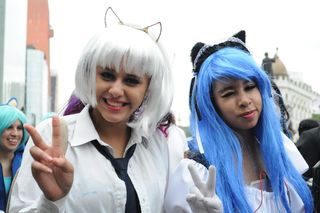It's a shame geekiness became cool, because now the cool kids don't want geeky people in geek culture.
Comic-Con: Where it Is Cool to Be a Geek
Celebrating geek culture in community.
Posted Jul 31, 2019
Here in downtown San Diego, we were recently visited by the usual scores of adventuresome crowds braving the heat to attend this year´s 50th anniversary of Comic-Con. For many attendees, indulging in fantasy fandom amidst thousands of like-minded enthusiasts is one of the highlights of the year. Comic-Cons are wildly popular events themselves, while also extending the opportunity to take advantage of all the benefits that convention cities have to offer.
As the gracious host city that we are, San Diego gets into the festivities as well. Downtown hotels are transformed into billboards featuring giant representations of featured characters, welcoming the influx of friends, fans, and followers. Restaurants and coffee shops invite the crowds to join them, with comic-book themed menu items, delivered by servers dressed as popular cult figures and superheroes. The weekend is an addictive experience for many of the regulars who have been coming for years. But why?

A Culture of Compatibility
Comic-Con attendees have the opportunity to interact with others who admire the same superheroes, cult figures, and game creators that they do. They also get to hear from panels of celebrities and movie stars—often having the chance to meet the A-listers, pose for photos, and score autographs. Given the size of current Comic-Con conventions, attendees can also meet up with scores of like-minded enthusiasts who share similar interests, no matter how unique or “niche.”
What kinds of people share niche obsessions? People who live in “con” cities and observe the deluge of attendees ever year might be able to tell you what they look like. But who are they, and what draws them to this event every year? Research has some answers.
Cons Celebrate Geek Culture
Dale Peeples et al. in "Geeks, Fandoms, and Social Engagement," (2018) explain how events like Comic-Con bring together like-minded enthusiasts.[i] Although they focused on the virtual community and “geek culture,” defined as including cosplay, as well as comics, fanfiction, and gaming, they make some valuable observations relevant to offline gatherings such as cons, many of which grow larger every year.
The authors recognize the increasing popularity of geek culture, noting, “With the rise in popularity of the superhero movie genre and video gaming in the early 2000s geek culture has greater social relevance and recognition, drawing more into the fold.”
What is a “geek?” They list one defining trait as “obsessive interest and knowledge in a given field,” which arguably applies to many of us. Accordingly, Peeples et al. observe that as the term loses its stigma, it gains ground regarding the scope of included interests.
They note that the Internet has made it easier to share what they term “traditional” geek interests that were comparatively obscure.
Indeed, the research by Peeples et al. focused on what they term “obscure media,” which includes comic books, gaming, and genre literature, as well as on more traditional geek pursuits within the domains of technology and science. They note that among those defined as geeks, strong friendships are cultivated with others who share interests, although this does not create a more expansive social network in a traditional sense.
Comic-Con happens to be an ideal venue to celebrate shared interests in person, although attendance is often preceded by a high degree of Internet communication, often on websites specifically geared towards con attendees, featuring con-related content from the obscure to the wildly popular. Attending cons in person also delivers the additional benefit of offering not only the consumption of popular media but engagement.
Cons Provide the Excitement of Engagement
Peeples et al. discuss the allure of “cons,” which they describe as multigenre conventions often geared to geek pursuits, featuring a variety of activities. As illustrated by the popularity of San Diego Comic-Con, cons involve both media participation and engagement.
Peeples et al. note that it is participation that defines “fandom.” Using popular examples such as Star Trek and Star Wars, they explain that merely watching a science-fiction movie does not make someone a geek. Rather, it is the passion that motivates subsequent discussion of the movie with friends and creating something personal around the film.
Accordingly, they distinguish consumption, which consists of watching a film, from engagement, which involves discussing the film, making costumes of the characters, or creating stories about other events in the world of the movie. They describe three factors that can motivate engagement as using fantasy to escape the pressures of the world, achieving a sense of belongingness within a like-minded subgroup, and enjoying engaging with media instead of passively consuming it.
Comic-Con Cool
Clearly, the crowds descending on Comic-Con cities every year to enjoy the festivities are there to engage. Consequently, Comic-Con has become among the most influential events within pop culture.[ii] To the extent they are well represented at every con, geek culture appears to be pretty cool after all.
References
[i]Peeples, Dale, Jennifer Yen and Paul Weigle," Geeks, Fandoms, and Social Engagement." Child and Adolescent Psychiatric Clinics of North America 27, no. 2 (2018): 247-267.
[ii]https://www.independent.co.uk/arts-entertainment/films/features/comic-con-2018-san-diego-popularity-cosplay-cult-superhero-movies-marvel-history-a8452236.html.


















